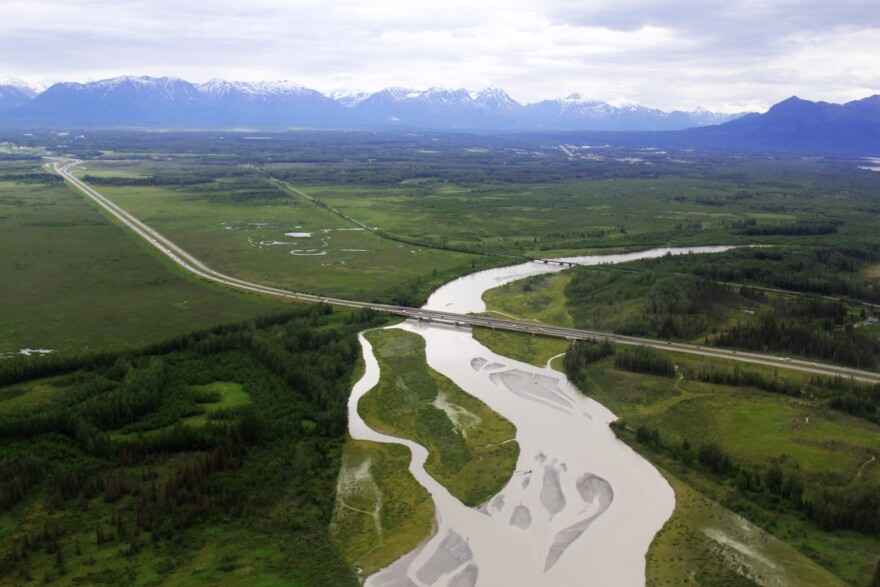The Glenn Highway, which connects Anchorage to Glennallen, is named after Edwin Glenn, who oversaw U.S. Army expeditions in Alaska in 1898 and ’99. Glenn was convicted of committing war crimes in the Philippines the year after he left Alaska.
A bill working its way through the state Legislature would start the process of renaming the highway. But one House member is calling House Bill 352 a case of cancel culture.
Glenn was a career army officer. In the late 1800s he oversaw two expeditions in Alaska. Then he went to the Philippines, which at the time belonged to the United States — a trophy from the Spanish-American War. The Filipinos were fighting for their independence.
Anchorage historian David Reamer said that Glenn ordered soldiers to waterboard a Filipino man.
“When we say that he was a torturer, we say this because he admitted this,” Reamer said. “He admitted to doing these things. He admitted to ordering it. He admitted to overseeing it. He was there at times of torture. ”
Waterboarding simulates drowning and can cause lasting physical and psychological damage.
Soldiers who witnessed what happened talked about it after returning home, leading newspapers to report it. That led President Theodore Roosevelt and his secretary of war, Elihu Root, to order an investigation.
When Glenn was court-martialed, he admitted to what he did but denied it was torture. He was found guilty, paid a fine and was suspended from his command for one month.
Now Alaska lawmakers are considering a bill that would provide a process for renaming the Glenn Highway. It would require the state to consult with tribes, Alaska Native organizations and communities in the area to gather input on the new name.
Big Lake Republican Rep. Kevin McCabe opposed the bill at a March 1 House Transportation Committee meeting.
“This is cancel culture. I want that on the record,” McCabe said. “This is canceling somebody who when he did waterboard did not think it was torture. You make it sound like we’re pulling fingernails and that sort of thing. Waterboarding is accepted even today.”
That hasn’t been true, ever since former President Barack Obama prohibited government agencies from using waterboarding.
McCabe said Alaskans don’t know what Glenn did because they didn’t witness it.
“If I look at this bill, if you want to know the truth, this is a bill right here to besmirch the name of a guy that’s long dead,” he said. “Who cares? The guy is long gone. That’s all this bill does is besmirch his name.”
Joshua Albeza Branstetter is a member of AKAPIDA, the Alaskan Asian, Pacific Islander, Desi American association. He said changing the Glenn Highway’s name would recognize the role Filipino Americans have played in the state for 100 years.
“But for this highway to be named after someone who was, for lack of a better term, canceled by the U.S. military and by Teddy Roosevelt, who approved the findings in his case for his war crimes in a war that cost the lives of over 200,000 Filipinos,” he said. “That history has in turn been canceled from our school books.”
Lisa Wade is a member of the Chickaloon Native Village. The highway was informally named after the village, which it runs through, before being named for Glenn.
“This bill represents much more than a simple name change,” she said. “To me, it does not represent cancel culture. It represents an opportunity. It represents an opportunity to show respect and maybe even some reconciliation for past harms that were perpetrated against Alaska Native peoples during the time this highway was created, and even the harms to the other Filipino people as well.”
She said that area tribes generally don’t name things after people, but use the names of geographic features. She said that at the time the highway was built, her tribe suffered greatly.
“And history is not one-dimensional,” she said. “However, that history has long been told from one dimension and has resulted in the invisibility of the beautiful and unique Indigenous peoples at the glamorization of people like Edwin Glenn.”
State officials estimate renaming the highway would cost $2 million, to change the road signs and other things. But since the bill itself wouldn’t rename the road but just set up a process to do it, it wouldn’t cost the state anything if the Legislature passed it. That means the bill doesn’t have any cost listed on what’s known as a fiscal note.
For Anchorage Republican Rep. Tom McKay, that part doesn’t make sense.
“It said there’s a zero fiscal note, but we did rename it, there would be a fiscal note, because we’d have to pay for all the road signs to be changed, the maps would have to be changed.”
Anchorage Democratic Rep. Zack Fields introduced the bill.
“These tribal members have been in this corridor certainly a lot longer than I have and maybe we should seek their guidance about whether the Chickaloon Highway or the Katie John Highway or some other name might be the most appropriate,” Fields said.
The transportation committee hasn’t scheduled a vote on the bill yet.

